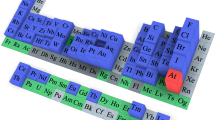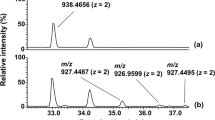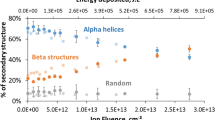Abstract
A LARGE number of alkylating agents react with proteins while forming relatively stable compounds. Ethyl methane sulphonate (EMS) reacts in proteins mainly with non-ionized amino groups and ionized sulphydryl- and carboxyl-groups1. Below pH 8, the carboxyl groups constitute the majority of the alkylated groups, and above this pH-level the amino groups are also alkylated. By varying the pH it is possible to vary the pattern of the groups which are alkylated2, and this can be utilized to attach tritium-labelled groups to proteins. In the work recorded here we used tritium-labelled EMS, which was synthesized from commercially available tritiated ethanol (ethanol-2-T, Radiochemical Centre, Amersham) and methanesulphonic anhydride.
This is a preview of subscription content, access via your institution
Access options
Subscribe to this journal
Receive 51 print issues and online access
$199.00 per year
only $3.90 per issue
Buy this article
- Purchase on Springer Link
- Instant access to full article PDF
Prices may be subject to local taxes which are calculated during checkout
Similar content being viewed by others
References
Alexander, P., and Cousens, S. F., Biochem. Pharmacol., 1, 25 (1958).
Ross, W. C. J., Biological Alkylating Agents (Butterworths, London, 1962).
Author information
Authors and Affiliations
Rights and permissions
About this article
Cite this article
ROSÉN, CG., EHRENBERG, L. & AHNSTRÖM, G. Tritium Labelling of Antibodies. Nature 204, 796–797 (1964). https://doi.org/10.1038/204796a0
Issue Date:
DOI: https://doi.org/10.1038/204796a0
Comments
By submitting a comment you agree to abide by our Terms and Community Guidelines. If you find something abusive or that does not comply with our terms or guidelines please flag it as inappropriate.



